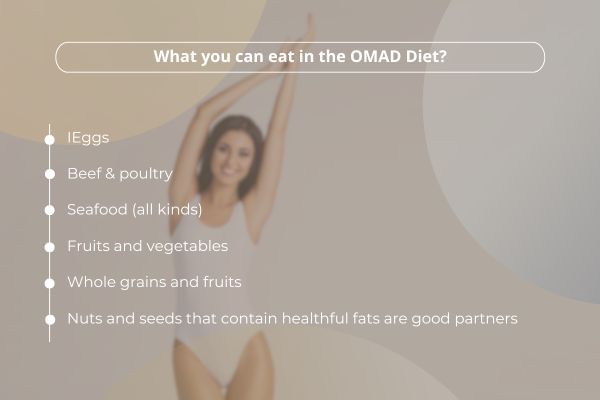What is OMAD and How Does It Aid Weight Loss?
The OMAD (One Meal a Day) diet is an extreme intermittent fasting method where you eat one meal within a one-hour window and fast for 23 hours. It promotes weight loss by creating a calorie deficit, offers simplicity, and may boost mental clarity, but it carries risks like fatigue and nutrient deficiencies.
- Weight Loss: Limits calorie intake, aiding short-term fat loss.
- Benefits: Frees up time, reduces meal prep stress, enhances focus.
- Risks: May cause tiredness, binge eating, or nutritional gaps.
- Suitability: Ideal for healthy adults; not for kids, pregnant women, or those with medical issues.
Consult a doctor before trying OMAD to ensure it’s safe for you.
Scared of the side Effects of Laser Lipo ,Choose a diet! When it comes to a weight loss plan, one of the most common choices is fasting and there are various forms of fasting one of which is the OMAD Diet, but what is diet omad and how can it help you to lose weight? In this blog post, we are going to explore all about this trending diet, who can follow it? Is it safe and effective? and so many other frequently asked questions.
Introduction to the OMAD Diet

The whole fasting diet can be divided into two categories, the first one is time-restricted fasting TRA and Alternate fasting. The first one is when a person does not eat or drink anything that contains calories for a period of time during the day. For instance not eating or drinking for 16 hours a day. The second one as its name suggests is when you eat and drink mindfully for one day and you do not drink or eat anything the next and the cycle goes on. All intermittent fasting have one thing in common and that is taking periodic breaks from eating.
The diet OMAD , also known as the “One meal-a-day” diet is not just a form of extreme intermittent fasting strategy. The plan is to eat just one meal a day in a span of one hour and to fast the rest of the day. This diet is recognized as a way to lose weight and to deal with health issues and chronic diseases. The basic principle of this type of eating plan is clear and the majority of the people can readily stick to it as they are usually allowed to consume whatever they like for one meal a day.
Why is the OMAD Diet popular?

From what you might have read on our website and other health and weight loss guidelines, you might be aware that most nutrition specialists currently recommend eating five or six small meals a day for weight loss if, of course, a person obeys the rules and stays off foods and drinks with high calories. In contrast, the OMAD Diet is the complete opposite of that; therefore, why is it so popular?
People who follow the diet OMAD are said to be more productive because they won’t feel as tired after lunch because their digestive system won’t be working. It is also said that this type of diet will cut calories by a huge amount! It is hard to have a calorie surplus when you only eat once a day. No matter what you eat, it’s unlikely that you will take in more calories than you burn.

This approach works because it gives people freedom, which is another reason for its popularity. A lot of people don’t want to deal with stressful diets where they have to plan all of their meals for the day. The OMAD diet isn’t like that; in fact, it doesn’t even have all of the usual caloric restriction methods. It’s not a new idea that some people only eat one meal a day. One meal a day, the plan which is not at all new, is now followed mainly by people who adhere to it for religious purposes or for those who wish to lose weight and keep healthy. But how does the OMAD diet work?
Is OMAD Good for You Mentally?
The simplicity of OMAD diet raises the question, “Is OMAD good for you mentally?” The OMAD diet has helped many individuals find relief from the constant decision-making and planning for traditional diets by eating only one meal a day. This popular approach can reduce mental pressure for you, allowing you to focus better on your more important daily tasks and feel more productive. Also, it can reduce your stress levels if you are overwhelmed by complicated diet routines.
How the OMAD Diet Works?
It is true that one meal a day plan is giving people more freedom but that does not mean that it does not have rules and restrictions. The most important rule is that you should eat that one meal of the day in a scheduled hour, for instance, if you have your food at 7 pm then you should not eat at 2 pm the next day.
If you decide to drink during the day, the only drinks that are allowed are zero-calorie beverages of your choice like Water, Black Coffee, and Unsweetened Iced tea. However, it is better to regulate the selection of low-calorie beverages and their amount otherwise people who want to drink more would be forced to choose more restrictive options for their meals. For additional insights into managing your diet effectively, check out our practical guide on using the liquid diet for weight loss.
OMAD Keto: A Good Combination for Faster Results
OMAD keto is a combination that can accelerate weight loss by adding up the benefits of intermittent fasting with a ketogenic diet. Interested already? So, make sure that your one daily meal is high in healthy fats, moderate in protein, and low in carbs. This approach keeps your body in ketosis and maximizes fat-burning during the fasting period. OMAD keto helps you sustain energy levels and improves mental clarity because of the healthy and nutritious food options and less stress for meal prep. Remember to stay hydrated and consult a healthcare professional before starting to use this powerful weight loss tool.
Balancing Food Freedom with Healthy Limits

You can eat almost whatever you like but there is still a catch! For example, you are not allowed to have a bigger plate than the standard ones and whatever is on that plate can not rise higher than 3 inches. So you should moderate how much you are going to eat!Although. the OMAD Diet is advocated for its freedom of choice for foods. You should still be careful and eat wisely if you would like to lose weight faster and more effectively. Also, your body needs different types of nutrition, so do not forget to eat various types of foods to receive all types of vitamins, proteins, and other important nutritious stuff.
Who can Follow the Diet OMAD?
The OMAD Diet is beneficial to people with metabolic syndrome and prediabetes or borderline diabetes and for those who would like to shed some extra pounds. That said, it is best to first try this method for one or two days a week to see if the body responds well or not. The One meal a day plan is also good for those people leading a hectic lifestyle.
When it comes to nutrition, almost all dietitians would advise starting out this diet in a more moderate way. For instance, if you are a beginner you might try fasting for 14 to 16 hours every day instead of having two meals a day and trying to get used to the new lifestyle first, then you can go ahead to the more extreme way. Please note that you should always consult with a doctor or a healthcare provider before you begin this type of weight loss program.
Understanding the difference between fasting and starvation is also essential. Fasting, when done correctly, is a controlled and intentional approach to reducing calorie intake that can provide numerous health benefits. Starvation, on the other hand, is an uncontrolled and prolonged lack of nutrition that can lead to serious health issues and nutritional deficiencies.

Who is not qualified for the OMAD Diet?
Like any other diet, the one-meal-a-day plan is not an option for all people. The following groups of people are not eligible to follow this method:
- Children and teenager
- Pregnant women and those who are breastfeeding
- Elderly people
- Those who have or had eating disorders
- Individuals with diabetes.
Due to the effects of fasting on blood sugar and blood pressure, intermittent fasting and an Omad diet is not suggested to people who have the following medical condition, unless it is under medical supervision:
- High levels of insulin
- in those who take medicines to lower their blood sugar and blood pressure.
- Steroid medications
The OMAD Diet is not a good idea for bodybuilders and those who do serious strength training as their body needs to be fed multiple times a day so that their muscle mass does not diminish.
Advantages and Risks associated with OMAD Diet
The OMAD diet is the center of attention due to its favorable metabolic health benefits. On the other hand, it has both advantages and disadvantages. Some studies point at the different paths the extreme version of intermittent fasting can take the body, be it the beneficial one or the adverse one. Scanty evidence is provided for diets such as this that would break fasting for long periods to supervise blood glucose levels and experiencing weight loss signs. Besides the good side, there is also a risk of a rise in blood pressure and cholesterol.
Benefits of the OMAD Diet
Although there has been lots of research on the OMAD Diet, it is still not possible to claim how safe or how risky it can be, since the data shows that it can be both good and healthy and risky at the same time. One clinical study conducted in 2007 shows that eating one meal a day is linked to higher blood pressure and increased cholesterol level so if you are following this diet you should stay clear of processed and fried foods.
Potential Risks and Considerations
Other problems associated with all types of fasting are:
- Fatigue and tiredness
- Binge eating and feeling extremely hungry makes it hard to be more mindful while eating.
- Extreme types of fasting can eventually lead to physical weakness, especially for those who have a regular exercise plan.
- Brain fog and the incapability to focus are other side effects of the diet OMAD.

On the Other hand, one small research of 10 people found out that fasting for nearly 20 hours a day can ultimately result in a more controlled level of blood glucose, due to the few number of people participating in this study it is not wise to conclude that OMAD diet or fasting can lead to lower blood glucose.
Another study suggests that fasting can lead to more resistance against diseases due to the positive pressure it has on the cells. It is also believed that Fasting can help you burn more fat, since the body is not receiving the energy it requires for a long period the fat cells in your liver start to turn into the main source of energy and thus you will have a healthier liver after some time.
Is the OMAD Diet good for weight loss?
Considering the facts and the risks and side effects of the OMAD Diet, we can say that it can lead to quick weight loss in the short run but almost every dietitian would not recommend this method for the long term as the side effects might get even more serious after a while. Even if there are no limitations on what people can eat during that one meal of the day, due to extreme hunger they feel it is more likely that they eat foods containing high levels of sugar, unhealthy fats, and low nutrition which in the long term can lead to other health problems.
Eating just once per day can lead to short-term weight loss but most people who would like to have a long-lasting transformation should exercise regularly and eat multiple times a day, so the OMAD Diet might not be the best idea for them.
What you can eat in the OMAD Diet?

The OMAD diet rules are non-prohibitive. You may eat the whole range of goodies and make your own wise choices for the goal of a healthier state. However, you should have such options to eventually become healthier:
- Eggs
- Beef & poultry
- Seafood (all kinds)
- Fruits and vegetables
- Whole grains and fruits
- Nuts and seeds that contain healthful fats are good partners
Seven-day Plan for the OMAD Diet
| Day | Meal | OMAD Calories |
| 1 | 16 grams tri-tip roast, 3 ml tallow, 1 medium russet potato (about 213 grams), 2 kiwis | 1850 |
| 2 | 10 grams Salmon Belly, 4 eggs, 1 tablespoon crème fraiche, 2 ml butter, 1 tablespoon olive oil, 1 avocado, ½ Cantaloupe | 1870 |
| 3 | 12 grams pork belly (about 340 grams), 1 large sweet potato (about 180 grams) roasted with olive oil, 1 tablespoon olive oil, 3 ml crème fraiche, 8 oz blackberries, ½ ml yogurt with 1 tablespoon heavy cream mixed in | 2000 |
| 4 | Rack of lamb (about 450 grams), 6 grams Asparagus (about 170 grams) sautéed in tallow, 3 ml tallow, 1 medium roasted russet potato, 1.5 grams dark chocolate, ½ ml strawberries | 2000 |
| 5 | 10 grams tuna salad with homemade olive oil mayonnaise, 3 deviled eggs with anchovies and creme fraiche, 2 ml creme fraiche, 3 ml olive oil, 2 stalks celery, ¼ ml olives, 1 oz anchovies, 1 kiwi | 1750 |
| 6 | 12 grams beef short ribs (about 340 grams), 2 ml tallow, 6 grams asparagus, 1 medium russet potato (about 213 grams), 1 deviled egg with anchovies | 2000 |
| 7 | 12 grams Ribeye steak (about 340 grams) seared in ghee, 1 tablespoon ghee, 2 Eggs scrambled with pancetta, 1 grams pancetta, 1/2 avocado (to top eggs), 1 tablespoon creme fraise (to top eggs), 1 ml blackberries | 2100 |
Comparing OMAD with Other Diets
The table differentiates the OMAD diet from three other trendy diet types, namely, vegan, paleo, and Mediterranean. The OMAD diet that consists of one meal a day gives the body a limited amount of calories.
| Key Factors | OMAD Diet | Keto Diet | Mediterranean Diet | Paleo Diet |
| Meal Frequency | One meal per day | 3-4 meals per day | 3-5 meals per day | 3-4 meals per day |
| Calorie Intake | Significantly reduced | Moderately reduced | Moderate to reduced | Moderate to reduced |
| Nutritional Balance | Can be unbalanced if not planned | High in fats, low in carbs, balanced if planned well | Highly balanced with fruits, vegetables, whole grains | Balanced but excludes grains and dairy |
| Flexibility | High flexibility in food choices | Moderate flexibility | High flexibility | Moderate flexibility |
| Sustainability | Challenging for long-term adherence | Sustainable if properly managed | Highly sustainable long-term | Sustainable with proper planning |
| Potential Risks | Risk of nutrient deficiency, fatigue, and binge eating | Risk of nutrient deficiency, keto flu, and digestive issues | Low risk, generally considered heart-healthy | Risk of nutrient deficiency, expensive |
Tips for Successfully Following the OMAD Diet
In general, the OMAD Diet and other types of fasting are considered to be safe for most healthy adults. But it does not mean you should be following such a plan unless you have discussed it with your doctor and they have approved this method for you.
- The OMAD diet does not suit everyone!
- You should be more careful about what you’re eating.
- This is not a long-term plan.
- If you have regular workout sessions, especially if they put a lot of strain on your body, consider trying other diets. Consider trying a Walking Plan According to BMI for customized workout routines.
- Do not begin this diet without preparing yourself first.
What is omad diet conclusion
At Elegant Hoopoe a top-class slimming center in Dubai, we are your trusted partner in different weight loss methods. In addition to non-invasive treatments, our dietary plans at Elegant Hoopoe help you in your journey toward a healthier slimmer body. Our group is made up of skilled experts who will guide you through the entire process creating a program that is especially constructed for you and your specific needs.
You can be confident that at Elegant Hoopoe you are receiving the best care in the industry as we are equipped with the latest technology and our facilities are state-of-the-art. You can benefit from advice given by our professionals on best home body contouring devices to supplement your fasting.






